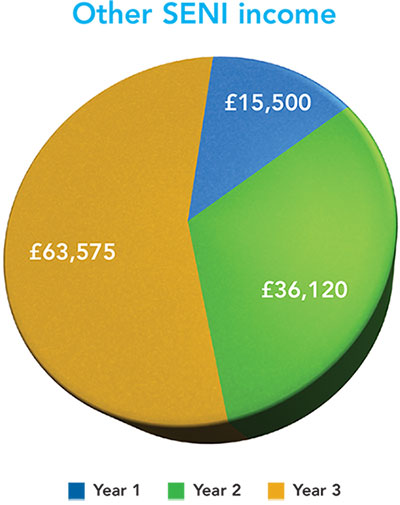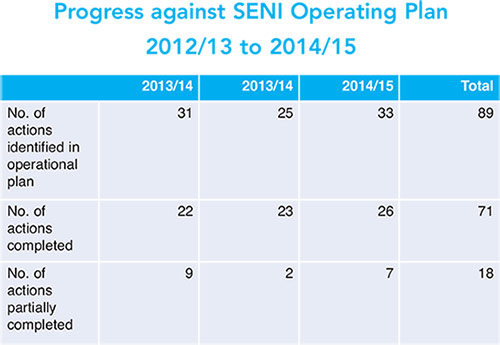Assessing the Social Economy Work Programme


Following the Department of Economy’s decision to re-appoint Social Enterprise NI (SENI) to deliver the next three years of the Social Economy Work Programme (SEWP), agendaNi outlines the evaluation of the scheme’s previous performance.
Set up on the recommendation of KPMG, which was tasked with evaluating the social economy in Northern Ireland’s potential, the SEWP was tasked with implementing and identifying initiatives to grow a sustainable social economy sector in Northern Ireland.
A consortium of social enterprises, Social Enterprise NI, was appointed in 2012 to design and lead the programme and last year the former Department of Enterprise, Trade and Investment (DETI) published their evaluation of the programme’s first operation stretching from October 2012 to September 2015.
As well as DETI’s overall evaluation of the programme the piece of work includes feedback from SENI membership and on the effectiveness of the organisation as a representative body for individual organisations and for the sector as a whole.
Operational plans
SENI fully achieved or partially met a “high level” of its targets over the three year period and was deemed to have made progress against all of the objectives set in the operating plans. The original business case proposed total funding of £450,000 for the Programme at £150,000 per year but project costs were 6.1 per cent less than originally expected. This was out down to a failure to draw down the full funding in year one due to early stage delays.
The transfer from Employers for Childcare (EfC) to Business in the Community (BitC) a lead partner in November 2013 brought about an increase in costs for services such as provision of office space and infrastructure (funded by DETI). However, despite the cost increase, evaluators were content to indorse the spend.
Despite not being outlined as a target, income was generated by SENI from a range of services between 2012/13-2014/15 and the analysis conculded that the Department was “contributing to, rather than fully” SENI activity. Over the period, SENI has increased its level of other generated income from £15,500 in year one to £63,575 in year three.
Monthly reporting and monitoring carried out by the Department, expected to shift to quarterly intervals, were identified as necessary and retained early in the programme.
Member survey
Of the 50 responses received from the identified 146 members of SENI, the majority of them felt that the service was “very, or quite effective”. SENI’s customer service was viewed in a “positive light”, however, there was a broad feeling that SENI was of more importance to the sector as a whole rather than for individual organisations. Members felt that SENI’s work on developing new products/services and influencing the Executive’s Social Economy policy were not as prominent in relation to their perceived performance. In terms of future opportunities, areas such as links and partnerships within and across sectors and lobbying on behalf of the sector were common among respondents.
Interestingly, the respondent trend suggested that although initially having a regional focus, over years two and three SENI activities had become more Belfast-centric.
Among the main strengths of the Social Economy sector identified were:
- value to people involved in the sector;
- provision of a local community focus by organisations within the sector;
- the flexibility, diversity and sustainability of the sector; and
- an ability to provide an environment for entrepreneurship.
Looking to future advancements, members priorities were identified as a greater focus on influencing wider government policy and facilitating collaboration with other networks. Overall “the overwhelming majority of members thought that there is a need for a representative body for the Social Economy sector in Northern Ireland”.

Conclusions from one-to-one interviews carried out by the Department with 10 key stakeholders in the sector found: “It was considered that SENI punched above its weight and has built good relations with other regional networks. However, a view was expressed that SENI should be more innovative and challenge government and that other representative bodies were more effective particularly in their broad strategic approach and marketing.”
In terms of value for money, the evaluation stated that there was “clear” support from stakeholders and SENI members for the project to continue.
Conclusion
The report concluded that SENI’s small team has performed well over the length of the programme in creating a positive brand image and raising awareness at both Executive level and with local politicians through the All Party Working Group. However, there is a recognition that the sector is not high on the agenda of government departments and this has proven challenging for SENI.
Members feel that SENI must “influence government policy and provide appropriate guidance to government”, as well as increase engagement, if it wants to promote a better understanding of the needs and concerns of the sector. Crucially, while targeting the voluntary and community sector it must ensure that it is distinctive from the sector. Members also felt that the Department for the Economy retaining the powers of policy development for social economy would best ensure a focus on enterprise and social business.
Overall, while the Social Economy Work Programme has not dramatically changed the landscape of the sector, there is strong recognition that the sector has benefitted from the programme delivery. There remains a recognisable need to continue with similar support going forward.






